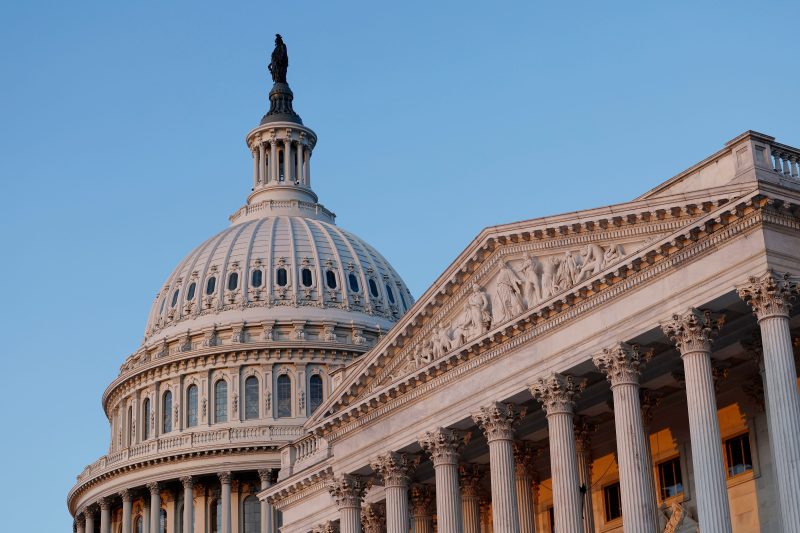
A bipartisan group of lawmakers from the U.S. House of Representatives announced on Thursday, July 10, that they have introduced a bill that would establish a set of national rules for college sports.
The announcement said that the bill is backed by leaders of three House committees, but it follows the basic contours of a discussion draft circulated in June by Reps. Gus Bilirakis, R-Fla., and Brett Guthrie, R-Ky.
Guthrie chairs the Energy and Commerce committee. Bilirakis chairs that panel’s Commerce, Manufacturing, and Trade subcommittee. In a show of Bilirakis’ and Guthrie’s desire to get the bill moving in the Republican-controlled House, Bilrakis’ subcommittee will hold a markup hearing on the measure on Tuesday, July 15, said Matt VanHyfte, the communications director for the full committee.
Dubbed the SCORE Act (Student Compensation And Opportunity Through Rights and Endorsements), the bill includes language that specifically would allow the NCAA, and potentially the new Collegiate Sports Commission, to make operational rules affecting schools and athletes in areas that have come into legal dispute in recent years and in areas that the NCAA wants to shield from future legal dispute.
The Commission, and some of those rules originate from the recent settlement of three athlete-compensation antitrust cases against the NCAA and the Power Five conferences. For example, the bill would put into law the fair-market-value assessment of athletes’ name-image-and-likeness (NIL) deals with entities other than schools provided under the settlement and an annual per-school limit on NIL payments that come directly from the schools. In addition, schools would be allowed to prevent athletes from having NIL deals that conflict with school sponsorship deals.
To back up that authority, the bill has specific language designed to shield the NCAA, the Commission, conferences and schools from antitrust and state-court lawsuits that could come from rules. It states that the adoption and/or enforcement of any rule established in concert with the bill “shall be treated as lawful under the antitrust laws and any similar State law, rule, regulation, requirement, standard, or other provision having the force and effect of law.”
This bill specifically would let the NCAA again set ‘parameters for the manner in which a student athlete may transfer’ as long as athletes get at least one chance to transfer and be immediately eligible to play. It also would let the NCAA set ‘rules with respect to the length of time a student athlete is eligible to compete’. Both of these issues have been the subject of numerous court cases in recent years.
The bill would prevent college athletes from being employees of their schools, conferences or an athletic association. The employment issue is the subject of an ongoing lawsuit in a federal district court in Pennsylvania.
The announcement of the bill included comments from two Democrats: Reps. Janelle Bynum (Ore.) and Shomari C. Figures (Ala.).
It also included a comment attributed to Guthrie; Rep. Tim Walberg (R-Mich), who chairs the Education and Workforce Committee; and Rep. Jim Jordan (R-Ohio), who chairs the Judiciary Committee.
In addition to putting into federal law colleges athletes’ ability to make money from their name, image and likeness, the bill includes a range of other provisions. Several of those have been added to the measure since Bilirakis and Guthrie circulated their discussion draft, and they appear aimed at winning additional support from Democrats. During a hearing of the Bilirakis-chaired subcommittee on June 10, the day the discussion draft was unveiled, numerous Democrats blasted the proposal as written at that point. Among the most strident was Rep. Lori Trahan (Mass.), who has had a longstanding interest in college-sports issues and has focused on athlete welfare.
Among the new provisions:
 Any school with a coach making more than $250,000 in base salary annually would be required to establish no later than July 1, 2027 – and then maintain – at least 16 varsity teams. This covers nearly every NCAA Division I school and would be aimed at preventing schools from dropping teams as a result of facing costs associated with paying athletes for their NIL, although over the past two decades, according to NCAA data, Division I schools have sponsored, on average, 19 teams.
Any school with a coach making more than $250,000 in base salary annually would be required to establish no later than July 1, 2027 – and then maintain – at least 16 varsity teams. This covers nearly every NCAA Division I school and would be aimed at preventing schools from dropping teams as a result of facing costs associated with paying athletes for their NIL, although over the past two decades, according to NCAA data, Division I schools have sponsored, on average, 19 teams.
 Schools would be required to make public information about student athletic fees and how those funds are used. Schools with media rights revenues of at least $50 million in their most recently completed fiscal year would not be allowed to use student-fee money “to support intercollegiate athletic programs.”
Schools would be required to make public information about student athletic fees and how those funds are used. Schools with media rights revenues of at least $50 million in their most recently completed fiscal year would not be allowed to use student-fee money “to support intercollegiate athletic programs.”
In practice, this would apply to top-revenue schools in the Power Four conferences. And some of those schools’ athletics departments annually report significant operating revenue from such fees. Just within the Big Ten and Southeastern conferences, Maryland, Rutgers and Auburn each reported receiving at least $7 million in student athletic fees in fiscal 2024, acccording to data colledted by USA TODAY Sports in conjunction with the Knight-Newhouse College Athletics Database at Syracuse University.
But schools could get around this by replacing student-fee money with more money from their general funds.
As in the discussion draft, the bill has language that would require most Division I schools to provide a series of health and educational benefits for athletes that are currently called for under NCAA and some conferences’ rules, but do not have the force of federal law.
Disagreements about the types of benefits for athletes that would be required under a federal law have stalled college-sports legislative efforts over the past few years in the Senate by Sens. Ted Cruz, R-Texas, Cory Booker, D-N.J. and Richard Blumenthal, D-Conn. Cruz now chairs the Senate Commerce Committee, and he has publicly expressed his interest in getting a bill put together this year that can pass in that chamber.
